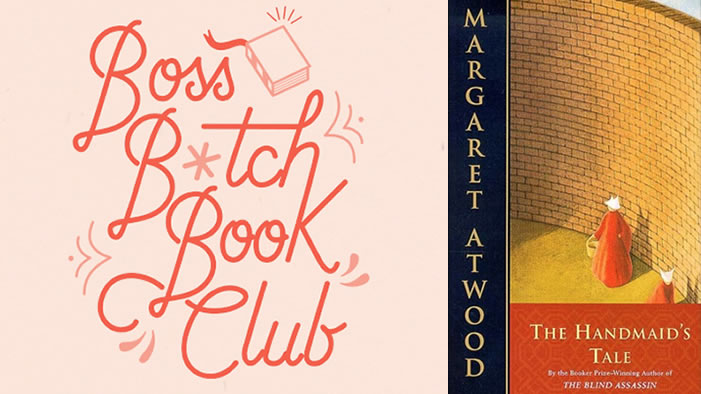Boss B*tch Book Club: The Handmaid’s Tale, Week Four

I have good news for you: The Handmaid’s Tale is coming to Hulu with Elisabeth Moss slated to play Offred !! !! !! !! I am super excited about this, and was a lot more excited until The Guardian checked me with the news that a white man will be in charge of the whole thing. The writer Devon Maloney explained why this is heinous and terrible so eloquently I’m going to quote her:
In the Republic of Gilead, a United States transformed overnight by a religious military coup, that patriarchy takes the form of a totalitarian government that determines the value and role of every woman according to fertility and class: all non-male bodies are sorted according to their use to rich white men. Not unlike slaveowners, these men vary in degrees of magnanimity. But at the end of the day, these women are still property – “two-legged wombs”, as Offred puts it. They are still things to be used. And the fact that Hulu has put a white man in charge of telling this story, for the benefit of a corporation, is so deeply ironic it would be hilarious if it weren’t so disturbing.
It won’t matter if Miller hires only women to work on the series; that would be great, but it doesn’t change the fact that at the end of the day, all of them would answer to a white man, however benevolent. And isn’t that the exact problem The Handmaid’s Tale seeks to address? Why tell dystopian stories if not to learn something from them?
Damn. Why indeed. Well. At least the series will bring a larger audience to this incredible and incredibly feminist story, right?!?!
I. Jezebel’s
….gives us a peek into the “outside” world and it is miserable: all the women who couldn’t conform or refused to be handmaids, but weren’t so offensive they had to be sent—permanently—away, now reside—permanently, or, as Moira says, “until your snatch wears out” (Ch. 38)—in a hotel, to be used as the Commanders and other men in charge. Gilead has built “release” for the men into the system, i.e. transgression’s okay, so long as it’s on our terms! *coughCASINOScough*
Anyway: what was your reaction to Jezebel’s? And, more importantly, what did you think of Offred’s reunion with Moira?!?! Is it satisfying?? (I say NO. Not long enough.) What does Moira tell us/Offred? How has Moira changed?
After recounting the conversation for us, Offred thinks:
“I don’ t want [Moira] to be like me. Give in, go along, save her skin. That is what it comes down to. I want gallantry from her, swashbuckling, heroism, single-handed combat. Something I lack.” (Ch. 38)
I’ve been asking questions about Moira throughout and this passage seems key to understanding her role for Offred in the novel. Why does Offred need to see her as a hero?? And: does seeing Moira, unseated from her horse, somehow enable Offred to break the rules later with….
II. Nick?
Nick…! I don’t know what else to say but finally and thank god there’s some romance in this story even if it’s not supposed to be “romance” (Ch. 40). How did you feel about their illicit affair? Do you feel bad for Luke, the possibly-dead, possibly-imprisoned husband? Were you, um, at least a little surprised that Offred turns into such a bada$$ rule-breaker???
III. Salvaging/Particulation
Ah…The moment when you remember this is an effing dystopian novel and something really, really appalling must happen…
First, there’s the salvaging. Ok, so three women are hung for unstated crimes and the observers are forced to pull the rope that kills them. Awful, but, like, ok. I can take that. It’s the particulation (and, no, that isn’t a word you’ll find in the dictionary, but sounds suspiciously like “participation,” huh?) that really gets you. Er, you know, that thing where a mob of handmaids—yes, you were reading right—tears an alleged rapist to pieces with their bare hands. Give something a name, call it a “ritual,” and, BAM, it’s totally legal and normal. Reactions?? Why at this point, so late in the novel, do you think Atwood even needs to include this bloody scene?? What does it tell us about Gilead that we aren’t able to learn elsewhere?
IV. Historical Notes
So this is at that moment in the book where your head is turned all the way around. We’re jolted from that super-suspenseful WTF just happened ending to… a jocular, peaceful academic conference. The lecture answers a number of questions we might still have, about how Gilead came to be, the rationale behind certain rituals like Particulation, the possessive “Offred” and “Ofglen” naming system. We learn that Offred’s story was recorded on cassette tapes that were found jumbled in a safe and that academics put them into the order in which we read them. How does this change your reading of the story? Do you see now why Offred kept calling it a “reconstruction” ?
We also learn that Offred’s tale of captivity is pretty much just a blip on the screen to the professors—what they’re interested in is the identity of the man who enslaved and exploited her. As the professor says wryly, “She could have told us much about the workings of the Gileadean empire, had she had the instincts of a reporter or a spy.” What do you think Atwood might be trying to say with this zoom-out to academia? What might she be saying about what academia does to history? To people?
**
If you didn’t get a chance to follow along, but want to read the book before the *TV SERIES*, you can still use this guide as a way to deepen your reading experience. Happy reading!












